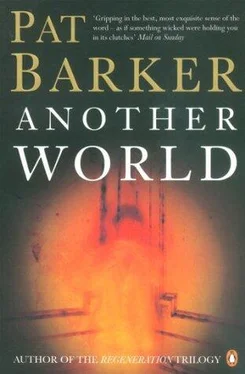‘It’s not for ever.’
She wipes her nose on the back of her hand. ‘Feels like it.’
‘Be better when we’ve got the house straight.’
She looks at the wall painting. ‘They’d have had servants, wouldn’t they? The Fanshawes.’
‘I suppose so. No birth control, though, or nothing reliable anyway.’
Ours wasn’t, Fran thinks.
‘Not that ours was,’ Nick says, with an apologetic laugh. ‘Still, the Great Snip will be.’
Great snip, she thinks scornfully. You don’t know you’re born. But she feels friendlier towards him than she has all morning, and by the time she’s combed her hair and changed her T-shirt she’s able to look out of the window at the milky blue of the sky and think, with some anticipation of pleasure, It’s going to be a real scorcher.
‘Christ, it’s fucking hot,’ says Paddington Bear. He’s standing on a patch of grass outside a circus tent, and the remark’s addressed to nobody in particular.
‘Look, Jasper,’ Nick says. ‘Paddington’s waving. Are you going to wave back?’
He half expects Jasper to be frightened of a six-foot-tall bear in a sou’wester, duffel coat and red wellies, but Jasper takes one look, pulls his hand free of Nick’s, and hurls himself on to the wellies with all the abandonment of a rubber fetishist. Paddington bends down, rather clumsily because of the wadding round his middle, and pats Jasper on the head before straightening up and saying, ‘Hello, Prof. How you doing?’
‘Fine,’ Nick replies, trying to place the voice.
‘Buddle,’ says Paddington in muffled tones. Losing patience, he takes off his head. ‘Buddle,’ he says again, running his fingers through his sweaty hair.
‘Hello,’ Nick says.
‘Can’t get a job,’ says Buddle, answering the unspoken question.
‘But you got a First.’
‘I think that’s part of the trouble.’
Buddle notices a family with three children approaching and starts to replace his head. At that moment Jasper looks up, sees a headless bear and screams. Nick picks him up and tries to console him as Buddle lumbers off, shouting loudly, ‘Marmalade sandwiches!’, ‘Luggage labels!’ and ‘Peru!’
That’s what a First in psychology does for you, Nick thinks, hoisting Jasper on to his shoulders and setting off in search of Fran. The position does his neck no good at all, but Jasper loves it, twining his fingers painfully round chunks of hair. Wonder he’s not bald. ‘Ow, Jasper.’ Jasper laughs.
Gareth’s walking on stilts, Miranda’s juggling with leather balls, kids all round them are skipping and playing skittles. Fran’s sitting on the grass watching them, looking a bit better, Nick thinks. ‘Come on, let’s go to the house. They’ll be all right here.’
A steep slope leads to the house. ‘Do you think it’s the same Fanshawes?’ Fran asks.
‘I don’t see why not.’
‘He must have gone up in the world.’ She nods to the house that towers over them, against a landscape of wooded hills.
‘Yes, well, he did. Made his money in the First World War, munitions. 1919 — ’ Nick spreads his arms to indicate the grandeur before them.
The question’s settled for them as soon as they enter the house, for there, in the hall, is a portrait of Sir William Fanshawe, older, but unmistakably the man on the wall, same keen gaze, same voracious intelligence. Sadder, perhaps. But then we all get sadder, Nick thinks.
‘I feel quite embarrassed for him, don’t you?’ Fran says.
‘No — oh, you mean his dick?’ Nick’s pulling money out of his back pocket. ‘No, green with envy, actually.’
The staircase leads to a long gallery, lined with Victorian paintings of no great merit. Wounded animals, blood on their paws, crying children, glistening tears on rounded cheeks, obsessively lingered over.
‘I don’t like his taste,’ Fran says, pausing in front of a dog that’s lying in the snow next to its dead master. ‘It’s very old-fashioned, isn’t it? I mean it’s old-fashioned for the twenties. You’d think the war had never happened, it’s —’
‘1898.’
It’s not just the war that’s missing either. They’ve passed several portraits of William Fanshawe, one of his first wife, Henrietta, two of his second wife, Isobel, three of the nephew who inherited the estate. But, as they know from the painting in Lob’s Hill, Fanshawe had a daughter and two sons. So far there’s not been a trace of any of them.
Where are the children?
Fran stops to look into one of the bedrooms. Huge four-poster bed with heavy curtains in a dull green-gold. Chaise longue, writing desk, cheval glass, windows full of sunlight.
‘All that and nursery maids and nannies to look after the kids,’ Fran says. ‘Marvellous.’
‘And the husband slept next door.’
‘Even better.’
‘Only you’d wake up and he’d be standing at the foot of the bed in his nightshirt demanding his conjugal rights.’
‘Oh, yeah? What’s changed?’
Ouch . ‘Fran, I —’
‘It’s all right.’
It isn’t — the cursory brush of her mouth over his tells him so — but she’s trying. They both are.
Three ornate rooms further on and Jasper’s thoroughly fed up, grizzling and stamping his feet. Fran kneels to comfort him and he hits her in the eye.
‘Hey!’ Nick says, shaking his arm. ‘You don’t do that.’
‘I’d better take him out.’
‘Do you mind if I stay a bit?’
‘No, go on. I’ll be at the tent.’
‘I won’t be long. Five minutes.’
As soon as he’s left alone Nick plunges into the maze of corridors, scanning the walls, peering into bedrooms, at paintings, at clusters of photographs on dressing tables, looking for a clue, any clue, to the secret of the house.
There’s nothing on the first floor, nothing in the bedrooms, where intimate family snapshots might be displayed, nothing on the staircase or in the main hall, where large-scale portraits of Fanshawe, his wives and other members of his family line the walls. Then, near the main entrance, opening off to the left, Nick comes across Fanshawe’s study. A printed notice by the door says that his desk is exactly as he left it when he went upstairs on the night of his death. Nick leans across the rope that closes off the room from visitors. It’s very quiet. A guided tour has just gone past and left the hall empty. Too quickly to feel any surprise at his own action, though normally he’s the most law-abiding of men, Nick unhooks the rope and goes into the room.
Tall windows behind the desk open on to a vista of wooded hills. Touching the back of Fanshawe’s chair, Nick sees Fanshawe’s signature in mirror writing on the blotter. A clock, stamps, stacks of paper, envelopes — no photographs.
But Nick’s already lost interest in the desk, for he can see from his new position that the room’s L-shaped, though the horizontal bar of the L is so short it’s hardly more than an alcove. Nick slips into it, with relief, because now he can’t be seen from the door.
He turns. There, hanging on the wall where nobody in the house can see it, is not a portrait, but the portrait, the photograph on which the wall painting in Lob’s Hill was unmistakably based. The boy, who here seems merely sullen and rebellious, rests his hand on his father’s shoulder. The girl looks unhappy, perhaps, but Isobel’s obviously proud of her small son, and Fanshawe — Fanshawe’s simply himself, alert, energetic, avid.
A fine family. That’s what anybody, on the evidence of this photograph, would think, so why put it here where almost nobody would ever see it? Even Fanshawe, if he wanted to look at it, would have had to get up from his desk and go into the alcove. He could never glance up from his desk and be surprised by this. Why? Because the sight of his children was, for some reason, painful? Because he needed to brace himself to look at them? Nick’s gaze tracks from one young face to the next, and a gust of despair sweeps over him. Not his own — Fanshawe’s.
Читать дальше












